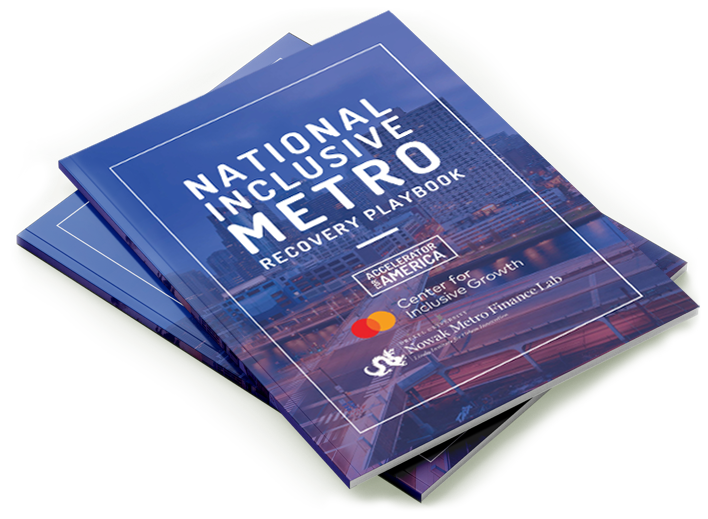Inclusive Growth
Welcome to the Small Business Equity Toolkit™
The Small Business Equity Tool provides local leaders and economic development officials with unique insight on opportunities to grow Black-, Latino-, Asian- and Women-owned businesses in the top 100 metro regions and cities. This first-of-its-kind data tool helps leaders better understand the significant gaps that exist between Black- and white-owned businesses in their region. Along with the National Inclusive Metro Recovery Playbook, the tool enables leaders to assess the gaps in their small business ecosystem and develop actionable strategies toward achieving an inclusive recovery.
About the Tool
Get actionable insights
Growing minority and women-owned business is critical to accelerating the economic recovery. However, the potential to grow minority- and women-owned businesses has been vastly untapped due to long-standing wealth and opportunity gaps that have been exacerbated by the pandemic.
Developed by Accelerator for America and the Drexel University Nowak Metro Finance Lab, in collaboration with the Mastercard Center for Inclusive Growth, the Small Business Equity Tool™ (SBET) enables local leaders to benchmark and measure progress toward growing minority- and women-owned small businesses against three key dimensions: number (business density), size (average annual revenue), and sector (percentage of businesses in high-wage sectors). It further provides groups of comparison peer cities based on city demographic and economic characteristics.
The SBET Index measures three dimensions that reveal the core of the small business economy prior to the Coronavirus pandemic: number, size and sector.
Number
Business Density
Business Density is measured by the number of businesses with employees (employer businesses) per 1,000 residents of a selected population group. A higher ratio of businesses to residents relates to higher levels of wealth for the selected population groups and more jobs and wealth opportunities for workers from the same group. The businesses-to-1,000 residents ratio is compared to the same metric for the comparison population group. A larger difference in these numbers indicates that the selected population group is further from achieving parity. Understanding business density and persistent density gaps between populations allows local leaders to set inclusive recovery goals.
New York City has 3.5 black-owned employer businesses for every 1,000 Black residents compared to 38 white-owned employer businesses for every 1,000 white residents. This means that the City would need to increase the number of Black-owned businesses by more than 10 times to achieve parity.

Size
Average Sales
Average sales represent the average annual sales of employer businesses. The larger the average sales of these businesses, the greater their economic impact. This category of measurement also includes a relative metric that assesses the average sales of businesses owned by the selected population group compared to the average sales of businesses owned by the comparison group. It assesses how close — or far — the average annual sales metric is from size parity.
New York City's Black-owned businesses average $864,000 in annual sales. In comparison, white-owned businesses average $2.76 million in annual sales. This means that the City needs to more than triple the average annual sales volume of Black-owned firms to achieve parity.

Sector
High-Wage Industry Participation
This category of measurement uses the percentage of employer businesses in the Professional and Technical Services sector as a proxy metric for businesses operating in high-wage sectors. Healthier entrepreneurial ecosystems tend to have a higher percentage of businesses operating in markets that yield higher sales and offer better wages. As with the other categories of the SBET Index, high-wage industry participation is also assessed against a comparison group.
12% of Black-owned businesses in the New York City Metropolitan Statistical Area (MSA) are in the Professional and Technical Services Sector, compared to 15% for white-owned firms in the same sector in the MSA. Diversifying the sector participation of Black-owned firms will naturally mean increasing the number of firms in the highest-paying industries.

Resources
Get a roadmap to an inclusive recovery
Local and regional leaders can use the data insights from the Small Business Equity Tool™ (SBET) with strategies outlined in our National Inclusive Metro Recovery Playbook to chart a clear course for a recovery that uplifts all communities.
The Playbook highlights best practices from cities across the country that are pioneering approaches to strengthen key dimensions of their minority- and women- owned business ecosystems.

This toolkit was made possible by the Mastercard Center for Inclusive Growth in partnership with Accelerator for America and Drexel University's Nowak Metro Finance Lab.
The Mastercard Center for Inclusive Growth advances equitable and sustainable economic growth and financial inclusion around the world. The Center leverages the company's core assets and competencies, including data insights, expertise and technology, while administering the philanthropic MasterCard Impact Fund, to produce independent research, scale global programs and empower a community of thinkers, leaders and doers on the front lines of inclusive growth.
For more info and to receive its latest insights, follow the Center on Twitter, @CNTR4growth, LinkedIn and subscribe to its newsletter.
Founded in 2017 by Los Angeles Mayor Eric Garcetti, Accelerator for America finds and develops solutions to economic insecurity and shares them with cities to create national change from the ground up. AFA is led by an Advisory Council comprising mayors, labor leaders, corporate CEOs and non-profit executives from across the country, and its work is driven by an exceptional staff.
For more info and to receive its latest insights, follow AFA on Twitter, @USAccelerate, LinkedIn and subscribe to its newsletter.
The Nowak Metro Finance Lab was founded in 2018 to help cities identify and implement innovative strategies and leverage public assets and fund public infrastructure for public benefit, with a focus on supporting inclusive and equitable growth. The Lab honors the legacy of Jeremy Nowak, the widely respected urban thought leader and practitioner. Read more about Jeremy's work and legacy.
For more info and to receive its latest insights, follow the Center on Twitter, @DrexelLab, Facebook and subscribe to its newsletter.
Start the conversation
Interested in learning more about the Small Business Equity Toolkit™?





